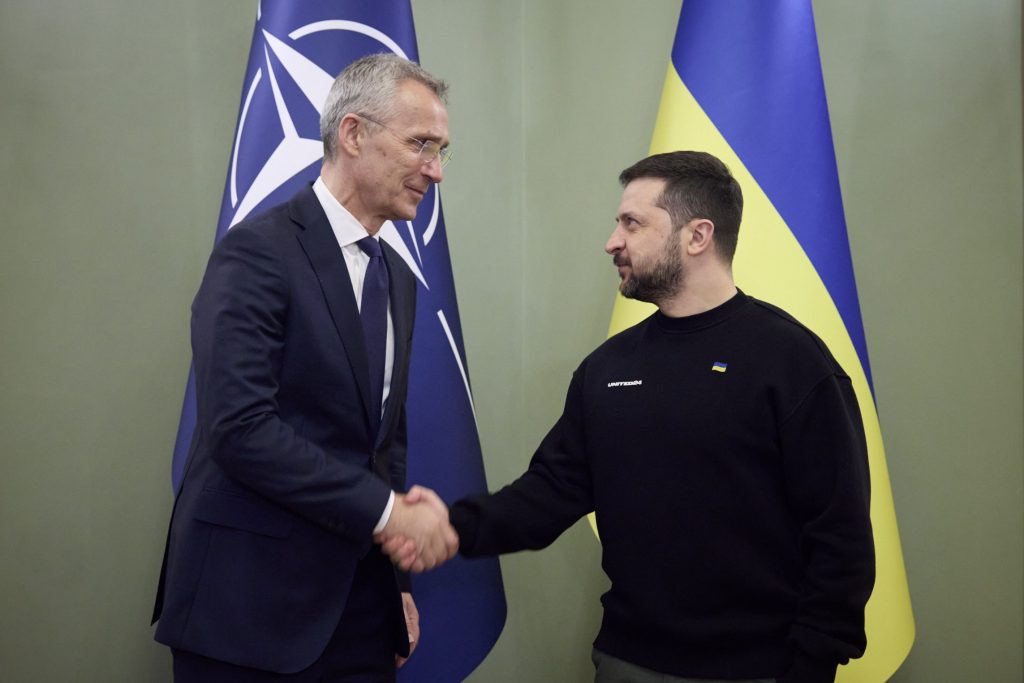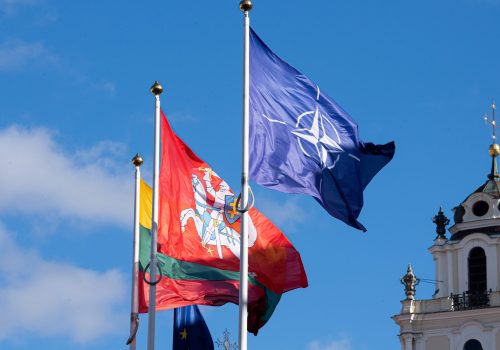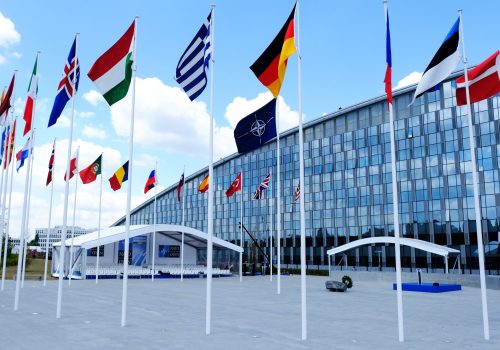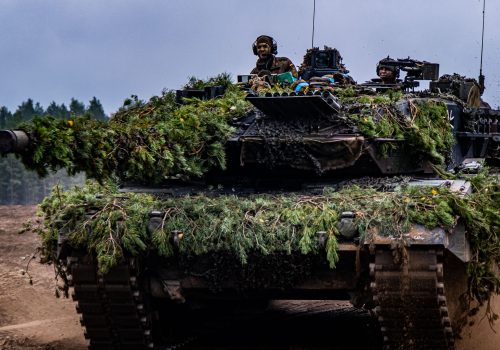As Ukraine continues its determined defense against Russia’s brutal invasion, NATO nations seem ready at their upcoming summit in Vilnius on July 11-12 to take two important steps to provide for Ukraine’s long-term security. NATO is expected to affirm an enduring pledge of arms support for Ukraine and upgrade the NATO-Ukraine Commission to a “Council,” thus providing a more regularized and effective consultative mechanism. But a third step is urgently needed as well. NATO allies should, as French President Emmanuel Macron described it, establish a “concrete” path for Ukraine to join the Alliance.
Other forms of deterrence have failed Ukraine twice since 2014, and only NATO membership will prevent a third failure. There are obstacles to be overcome, not least of which is that Ukraine is at war and Russian forces occupy some of its internationally recognized sovereign territory. But creating a concrete path for future membership at Vilnius is crucial to enhance Ukrainian morale during its difficult counteroffensive and to strengthen its position in any future negotiations with Russia. It will allow NATO to bolster its credibility by taking an overdue step toward a membership pathway, consistent with its 2008 statement that Ukraine “will become” a member of NATO.
With the Vilnius Summit only a few days away, differences remain among allies about Ukraine’s aspirations, and those differences need to be resolved. There is, however, a way forward that all NATO nations should be able to accept. Namely, the summit should establish a High Level Group reporting to NATO’s secretary general to design a roadmap for Ukraine’s fast-track membership. All NATO nations would have a voice in the group. This roadmap should be delivered no later than next year’s NATO summit in Washington.
The High Level Group could include either ambassadors from the North Atlantic Council or senior officials from member nations, an approach NATO has previously undertaken to analyze and resolve difficult issues. In effect, this would allow for an expedited process akin to the one utilized to extend membership offers to Finland and Sweden. In the case of Ukraine, it is possible that there might be divergent views among members of the group. While unanimity is obviously desirable, the group should be authorized to present alternative analyses if agreement cannot be reached.
As part of its remit, the group would stay apprised of the ongoing military interactions between NATO, its members, and Ukraine. Given the high degree of NATO standardization that Ukraine has already achieved, it should be expected that such efforts would proceed smoothly and that the group would not find any standardization issues as a bar to membership.
The two most complex issue areas for the group to assess will be:
- Issues of corruption, judicial independence, and protection of minority rights, and
- The conditions in the conflict that would generate circumstances in which a membership offer would be extended.
With respect to the first set of issues, Ukraine has been taking significant steps. It has established a Special Anti-Corruption Prosecutor’s Office, a National Anti-Corruption Bureau of Ukraine, a High Anti-Corruption Court, and a High Qualification Commission of Judges. Independent international experts have been engaged in such efforts, as has civil society. These efforts have borne fruit. By way of example, the head of Ukraine’s Supreme Court is facing corruption charges related to an alleged $2.7 million bribe. More efforts are nonetheless required.
Meanwhile, the European Commission for Democracy Through Law (Venice Commission) has undertaken intensive reviews of the minority rights situation in Ukraine. Its June 2023 report “welcome[d] the adoption of a long-expected new Law on National Minorities, which provides a number of guarantees in conformity with international standards.” The report further stated that “to ensure full conformity with such standards, a number of provisions of that Law should be reconsidered.”
In judging Ukraine’s progress on these issues, the group would have the benefit of the Venice Commission’s report, discussions with Ukrainian authorities and civil society, and consultations with the European Union, which has included such issues as part of extending candidacy status to Ukraine.
The more complicated set of issues for resolution by the group involves deciding under what conditions of conflict a membership offer should be extended. The most desirable circumstance, of course, would be a victory by Ukraine that regains the country’s pre-2014 borders and is followed by a settlement with Russia. Were that to happen by the time of the Washington summit, there would be strong reasons for the Alliance to extend a membership offer. Given the uncertainty of war, however, it would also be valuable for the group to evaluate at least two other circumstances.
First, it could be the case that Ukraine succeeds in achieving significant control of much of its territory but not all. The group might consider whether membership with a guarantee covering only that portion of territory should be considered. This is an option that would likely have a higher degree of clarity closer to the Washington summit. As noted above, different NATO nations may have different views with respect to such an approach, but the group could design relevant recommendations and propose a roadmap for each.
Second, it might be the case that Ukraine is entirely—or very substantially—successful in regaining its pre-2014 borders but that Russia continues sporadic or low-level attacks, so the conflict is somewhat diminished but not ended. Again, the group could make recommendations as to whether a membership offer should be extended in such circumstances.
In sum, heads of state and government should establish a High Level Group in Vilnius tasked to provide an evaluation of the key issues affecting Ukraine’s potential membership and to present specific recommendations at the Washington summit that constitute the “concrete” path suggested by Macron. This would be a significant step forward politically for Ukraine. It would prompt NATO to define the conditions for membership while not immediately altering the status quo. It is a proper compromise between those who want to extend an immediate membership offer and those who prefer to avoid the membership question until the war is settled.
Franklin D. Kramer is a distinguished fellow and board member at the Atlantic Council. He is a former US assistant secretary of defense for international security affairs.
Hans Binnendijk is a distinguished fellow at the Atlantic Council. He previously served in the White House as special assistant to the president for defense policy and as director of the Institute for National Strategic Studies.
Christopher Skaluba is the director of the Transatlantic Security Initiative in the Atlantic Council’s Scowcroft Center for Strategy and Security. He formerly served as the principal director for European and NATO policy and the principal director for strategy and force development in the office of the US secretary of defense.
Further reading
Tue, Apr 11, 2023
Defining success for NATO’s Vilnius summit: A primer
Issue Brief By
A successful NATO summit in July requires significant progress on a host of NATO’s political and military priorities, especially those enumerated at Madrid.
Thu, Apr 13, 2023
Memo to NATO leaders
Memo to... By
NATO’s upcoming Vilnius summit has to produce more than a rhetorical expression of support for Ukraine. Allied leaders must leverage the opportunity to drive forward a NATO defense and deterrence posture that underscores NATO’s resolve to support Ukraine and begins the process of fully integrating Ukraine within the transatlantic community, including as a NATO member.
Tue, Apr 18, 2023
NATO deterrence and defense: Military priorities for the Vilnius Summit
Issue Brief By Franklin D. Kramer
Ahead of the NATO Summit in Vilnius, this issue brief sets forth six priority actions that NATO should undertake to enhance its deterrent and defense posture.
Image: NATO Secretary General, Jens Stoltenberg (left), is received by the Ukrainian President, Volodymyr Zelensky (right), during his first visit to Kiev.



